|
Levitate
the Pentagon (1967)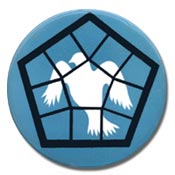
Browse photos of the 1967 Pentagon March.
Read other partipants' accounts of the Pentagon
March.
 On
October 21, 1967, 70,000 demonstrators came to Washington, D.C. to "Confront
the War Makers." This was the first of the biannual Anti-War demonstrations
to fuse protest with the whimsicality of the counter culture and to take
civil disobedience to new levels of confrontation. It would become the
prototype for the demonstrations at the 1968 Democratic Convention in
Chicago -- except that the latter was marred by extensive police violence. On
October 21, 1967, 70,000 demonstrators came to Washington, D.C. to "Confront
the War Makers." This was the first of the biannual Anti-War demonstrations
to fuse protest with the whimsicality of the counter culture and to take
civil disobedience to new levels of confrontation. It would become the
prototype for the demonstrations at the 1968 Democratic Convention in
Chicago -- except that the latter was marred by extensive police violence.
 Initiated and organized by "the Mobe" (the National Mobilization
Committee to End the War in Vietnam), a loose coalition of 150 groups,
some of the events of the weekend were planned and some were not. They
provided something for everyone, from committed pacifists to Vietcong
sympathizers, united only by the common aim of ending the war.
Initiated and organized by "the Mobe" (the National Mobilization
Committee to End the War in Vietnam), a loose coalition of 150 groups,
some of the events of the weekend were planned and some were not. They
provided something for everyone, from committed pacifists to Vietcong
sympathizers, united only by the common aim of ending the war.
 David Dellinger, Mobe co-ordinator and radical pacifist, asked Jerry Rubin
to be project director for the march. Rubin had run the Viet Nam Day teach-in
at Berkeley on May 21-22, 1965 and other anti-war actions on the west
coast since then. It was his idea to target the Pentagon, but it would
not be the only place of protest that weekend.
David Dellinger, Mobe co-ordinator and radical pacifist, asked Jerry Rubin
to be project director for the march. Rubin had run the Viet Nam Day teach-in
at Berkeley on May 21-22, 1965 and other anti-war actions on the west
coast since then. It was his idea to target the Pentagon, but it would
not be the only place of protest that weekend.
 The biggest rally was held at the Lincoln Monument on the D.C. Mall. During
the afternoon, people lined the reflecting pool and listened to speeches.
Dellinger said the time had come to go from protest to resistence. Dr.
Benjamin Spock, world famous for his book on baby and child care, told
the crowd that he felt betrayed by President Johnson. He had campaigned
for LBJ in 1964 because he promised not to escalate the conflict in Vietnam.
Four months after the election the President sent massive numbers of American
troops into battle.
The biggest rally was held at the Lincoln Monument on the D.C. Mall. During
the afternoon, people lined the reflecting pool and listened to speeches.
Dellinger said the time had come to go from protest to resistence. Dr.
Benjamin Spock, world famous for his book on baby and child care, told
the crowd that he felt betrayed by President Johnson. He had campaigned
for LBJ in 1964 because he promised not to escalate the conflict in Vietnam.
Four months after the election the President sent massive numbers of American
troops into battle.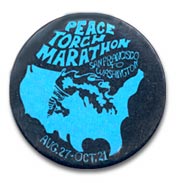
 The rally was also the final destination of the Peace Torch Marathon.
On August 6, a torch was lighted in Hiroshima, where the first atom bomb
had been dropped in 1945. It was flown to San Francisco and on August
27 began its journey to Washington, D.C.
The rally was also the final destination of the Peace Torch Marathon.
On August 6, a torch was lighted in Hiroshima, where the first atom bomb
had been dropped in 1945. It was flown to San Francisco and on August
27 began its journey to Washington, D.C.
 On October 20, several hundred people marched to the Justice Department
to turn in a thousand draft cards. They were solemnly handed to an Assistant
Attorney General who initially refused to accept them. Left on a table
by the delegation, eventually they were sent to local draft boards "for
reappraisal."
On October 20, several hundred people marched to the Justice Department
to turn in a thousand draft cards. They were solemnly handed to an Assistant
Attorney General who initially refused to accept them. Left on a table
by the delegation, eventually they were sent to local draft boards "for
reappraisal."
 Blacks were more numerous among the rally speakers than listeners because
most of the latter went to a separate rally staged near Howard University
a few miles away. Rally speakers (and march organizers) were noticeably
older than those in the audience.
Blacks were more numerous among the rally speakers than listeners because
most of the latter went to a separate rally staged near Howard University
a few miles away. Rally speakers (and march organizers) were noticeably
older than those in the audience.
 After the speeches, about 50,000 people set off for the Pentagon. It took
them about an hour and a half to walk two miles across the Memorial Bridge
and down a service road to the north parking lot where a second rally
was scheduled.
After the speeches, about 50,000 people set off for the Pentagon. It took
them about an hour and a half to walk two miles across the Memorial Bridge
and down a service road to the north parking lot where a second rally
was scheduled.
 At the other end a group of hippies was trying to exorcize the Pentagon.
The brainchild of Abbie Hoffman, the plan was for people to sing and chant
until it levitated and turned orange, driving out the evil spirits and
ending the war in Viet Nam. The Pentagon didn't move.
At the other end a group of hippies was trying to exorcize the Pentagon.
The brainchild of Abbie Hoffman, the plan was for people to sing and chant
until it levitated and turned orange, driving out the evil spirits and
ending the war in Viet Nam. The Pentagon didn't move. 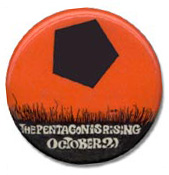
 While a few dozen chanted, a few thousand marchers bypassed the parking
lot for the Pentagon entrance. They were met by 2,500 federal troops and
200 U.S. marshals. The troops formed a human barricade protecting the
Pentagon steps. Ropes also demarcated how close the demonstrators could
get. U.S. Marshals arrested anyone who got past the lines of troops, or
stepped over the ropes.
While a few dozen chanted, a few thousand marchers bypassed the parking
lot for the Pentagon entrance. They were met by 2,500 federal troops and
200 U.S. marshals. The troops formed a human barricade protecting the
Pentagon steps. Ropes also demarcated how close the demonstrators could
get. U.S. Marshals arrested anyone who got past the lines of troops, or
stepped over the ropes.
 Those who wanted to commit civil disobedience repeatedly challenged the
line. At one point a couple hundred young demonstrators charged up a vehicle
ramp. They were surrounded and eventually removed. A few found an unguarded
entrance used by the press and tried to invade the Pentagon. They were
physically thrown out, leaving some bruised and bloody. As they bounced
down the steps many more rushed up. They too were repulsed, with the help
of rifle butts and a little teargas. The crowd around them sang "America
the Beautiful."
Those who wanted to commit civil disobedience repeatedly challenged the
line. At one point a couple hundred young demonstrators charged up a vehicle
ramp. They were surrounded and eventually removed. A few found an unguarded
entrance used by the press and tried to invade the Pentagon. They were
physically thrown out, leaving some bruised and bloody. As they bounced
down the steps many more rushed up. They too were repulsed, with the help
of rifle butts and a little teargas. The crowd around them sang "America
the Beautiful."
 When the permit expired at 7:00 p.m., a couple thousand demonstrators
chose to spend the night. No one forced them to leave, though many did
depart as the temperature turned cold. The rest lit bonfires made from
picket signs and stayed up singing, talking, and confronting the soldiers.
Some protestors tried to talk to the troops facing them with sheathed
bayonets; some taunted them; some put flowers in their gun barrels; some
just stood and stared.
When the permit expired at 7:00 p.m., a couple thousand demonstrators
chose to spend the night. No one forced them to leave, though many did
depart as the temperature turned cold. The rest lit bonfires made from
picket signs and stayed up singing, talking, and confronting the soldiers.
Some protestors tried to talk to the troops facing them with sheathed
bayonets; some taunted them; some put flowers in their gun barrels; some
just stood and stared.
 When the sun rose, a few hundred people marched to the White House to
wake up President Johnson with morning chants. Some were arrested for
picking flowers in Lafayette Park. Most of those who spent the night at
the Pentagon left on Sunday after a small afternoon demonstration. Right
after midnight on Monday the couple hundred that remained at the Pentagon
were arrested, for a total of 681 arrests for the weekend. One hundred
were treated for injuries.
When the sun rose, a few hundred people marched to the White House to
wake up President Johnson with morning chants. Some were arrested for
picking flowers in Lafayette Park. Most of those who spent the night at
the Pentagon left on Sunday after a small afternoon demonstration. Right
after midnight on Monday the couple hundred that remained at the Pentagon
were arrested, for a total of 681 arrests for the weekend. One hundred
were treated for injuries.
 This demonstration was one of several parallel actions around the world.
People in six European countries, Israel, Japan and Australia marched
or picketed against the presence of U.S. troops in Viet Nam. Several U.S.
cities and college towns also had small demonstrations and vigils. In
the next year protest against the War would spread and intensify.
This demonstration was one of several parallel actions around the world.
People in six European countries, Israel, Japan and Australia marched
or picketed against the presence of U.S. troops in Viet Nam. Several U.S.
cities and college towns also had small demonstrations and vigils. In
the next year protest against the War would spread and intensify.
Other participants in the Pentagon
March remember
Photos of the 1967 Pentagon March
by Jo Freeman
Please click on thumbnails to view the complete image
|
|
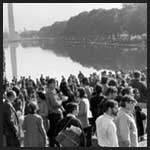
|
|
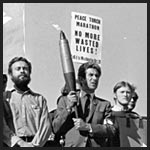 |
| . |
Crowds gather in front of the Lincoln Memorial. |
|
|
|
|
The
Peace Torch Marathon arrives at the Mall. |
|
|
| |
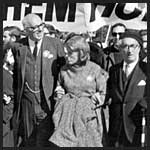
|
|
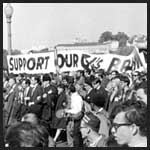 |
| . |
Dr. Benjamin Spock is in the front line of notables as it
leaves the Lincoln Memorial. |
|
|
|
| . |
The front line of the march along with the lead banner are
swamped by the surrounding crowd. |
|
|
| 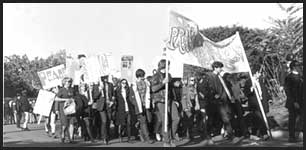
|
| The march line narrows to
go down the service road in Virginia. |
|
| |
|
|
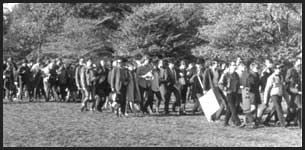 |
| By the time it reaches the
Pentagon, the line has thinned. |
|
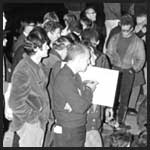 |
|
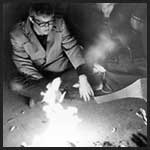 |
|
|
| . |
Bonfires are lit to stay warm. |
|
|
| |
|
|
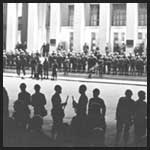 |
|
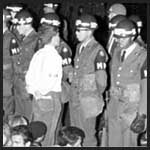 |
|
|
| . |
Confronting the War makers |
|
|
| |
|
|
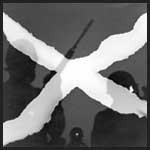 |
| |
|
|
| |

|
|